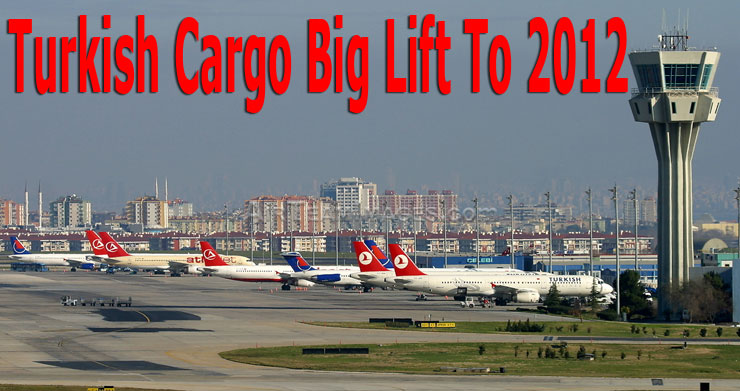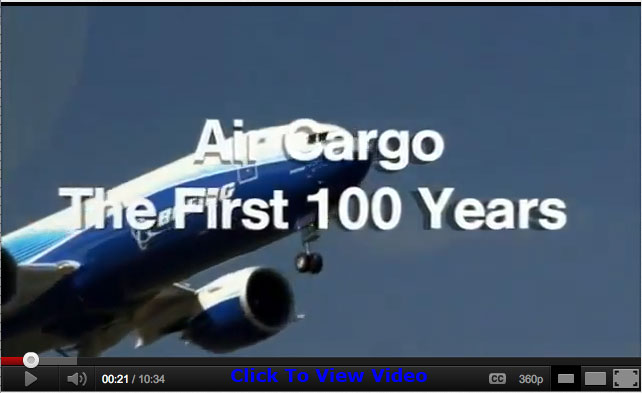Turkish
Cargo Big Lift To 2012

 As
globalization shrinks the planet and turns international commerce into
something that feels like an outdoor, neighborhood farmer’s market,
where everything and anything is available to all, the search for new
markets has never been more important. The spotlight has now turned
on “The New Europe,” specifically the countries and new
independent states that emerged after the splintering of the Soviet
Empire. As
globalization shrinks the planet and turns international commerce into
something that feels like an outdoor, neighborhood farmer’s market,
where everything and anything is available to all, the search for new
markets has never been more important. The spotlight has now turned
on “The New Europe,” specifically the countries and new
independent states that emerged after the splintering of the Soviet
Empire.
Places like Albania, Slovenia, the Danube
Delta, the Carpathian Mountains, the Curonian Spit on the Baltic Coast
and even Cappadocia in Turkey are all somewhat below the radar, strikingly
beautiful, anxious to establish their own identity, parade their own
culture and celebrate their own history.
Today, with most of Eastern Europe wide
open for business, there is no shortage of airline companies willing
to fly into new addresses in hopes of plugging into what will stack
up to be an exciting decade of growth and development ahead.
Enter Turkish Airlines, based in its legendary
home, Istanbul—it’s amazing that what was once old is brand
new again as this storied airline, currently celebrating 79 years since
its creation, is vibrant and full of life, with big plans for adding
fleets of new aircraft and destinations all around the world.
Today Turkish Cargo is one of the more
exciting and wide- ranging operators with both freighter and extensive
belly lift.
Istanbul, situated at the ancient and
now modern crossroads of Europe and Asia, launches a fantasy of multi-modal
transportation resources to all points of the globe with Turkish Cargo
smack dab in the middle of all the action and excitement.
Much was made of the showcase buzz that
Turkish Airlines received earlier this year in March as IATA World Cargo
Symposium was conducted in Istanbul.
But Turkish Cargo does not stop there.
Right now with a new organizational set up,
the flag carrier has earmarked an even more dramatic change in the form
of enhanced air cargo services and additional new destinations in 2012.
Recently we spoke to Halit Anlatan, Turkish
Cargo vice president of sales and marketing, Ebubekir Kusak, the carrier’s
cargo publicity and advertisement manager, and Ali Turk, who serves
Turkish Airline as Vice President of cargo operations. It was an open
and wide ranging conversation that took place inside the airline headquarters
at busy Ataturk International Airport Istanbul.
Listening to these people whilst gazing
out a picture window at the airport below, confidence and destiny was
the message, delivered loud and clear.
Turkish Cargo can’t wait until tomorrow
because they look better every day.
“We are developing our Istanbul
hub, which is situated at the crossroads of Europe, Middle East, Africa
and former CIS countries.
“There is much potential for air
cargo and many niche markets within these areas for us,” said
Halit Anlatan declares.
“Turkish Cargo strongly believes
that in the near future, our vision of growth by adding destinations
and new aircraft will continue to develop our cargo business with Istanbul
as a hub.
“Turkey is not to be overlooked—it
is a country of 70 million and itself represents great potential for
the entire menu of air cargo services and we are expanding and developing
our capabilities to meet that need.
“Turkey represents a balanced import/export
business as the economy is quite strong here.”
Another main focus right now at Turkish Cargo, Mr. Anlatan pointed out,
is security and the development of e-freight.
“We have dedicated considerable
resource to security, offering multi-layered security up and down the
system. Turkish Cargo is also investing in implementing and continually
upgrading our IT offering with e-freight and other paperless efforts
all destined to offer transparency with our customers and ease of use
every step of the way.
“Hub Istanbul is looking via Turkish
Cargo to open connections across Africa and Middle East and former CIS
with destinations such as Addis Abba and Nairobi (early 2012).
“Our passenger side includes many
narrow-bodied services to these gateways whilst continuing with our
bigger aircraft to Asia. To USA, we operate double dailies to New York
and also service to Chicago and Los Angeles.
“Turkish also connects many of the
capitals of Europe and we are looking to add capacity by expanding our
all-cargo freighter served network.
“Looking ahead to our regional Middle
East, former CIS, Africa, India Asia offerings will serve our expanding
markets based on inbound demand weakness, using the great flexibility
of the freighters, A310s and others to build payloads by adding cities
while awaiting development of better two way traffic.
“For example, one routing under
this philosophy is Cairo/Addis Abba, “Where we already have a
solid, thrice-weekly service operating in and out of Cairo, we expand
to Addis Abba, opening new avenues for trade and opportunities all around,”
Mr. Antalan said.
“In summary, Turkey enjoys great
historical ties with many countries of the world, including a vast number
of ‘New Europe’ destinations that used to be part of CIS.
“Today, as these now open trade
countries look to expand their offering with the rest of the world,
Turkish Airlines stands ready to deliver the service and support to
make growing business possible.
“For example we have just launched
twice-weekly freighter services flying to Bishkek, the capital of Kyrgyzstan
into Manas Airport via Shanghai.
“We already serve Almaty, and we
are planning to add Ashgabat, capital of Turkmenistan, to our network
soon.
“These are names that are not always
in the news, but they are traditional markets to Turkey and we are moving
to serve them with our world class air cargo service.
“Turkish Cargo will expand its India
offering with flights to Chennai.
“We began with Mumbai earlier this
year.
“Maybe lesser known,” points
out Ebubekir Kusak, “is that Turkish Airlines is the eighth largest
air carrier in the world, serving with 177 aircraft to 190 destinations
and 32 freighter or all-cargo destinations in our winter schedule.
“Currently about 1000 people at
Turkish Airlines are assigned to air cargo, which delivers about 9 percent
of income to the airline,” Mr. Kusak points out.
“In terms of challenges, what people
should understand about Turkish Airlines is that we are not just a regional
but actually a global network carrier,” Ebubekir Kusak attests.
“And every flight is an air cargo
flight,” Kusak says.
“We are undergoing an unprecedented
fleet expansion as THY operates about 35 wide bodies at the moment,
including two new, just delivered A330-200F aircraft with 3 new ones
coming every year.
“THY currently operates four A310Fs
and two A330Fs at the moment, with three new freighters coming every
year into the future as we grow our business through 2014,” Mr.
Kusak said.
“Our strategy is to grow our business
15 percent a year into the future as we feel our expansion to new destinations
and new aircraft deliveries will help us grow out of much of the financial
difficulty felt elsewhere,” Halit Antalan said.
Touching for the moment on e-freight,
Mr. Anlatan noted that while customs in Turkey can be challenging, the
biggest bottleneck in his estimation is the “varying demands of
various countries that are otherwise eager trading partners.
“It is past time for some kind of
standardization recognized by all international trading partners that
will allow our electronic initiatives to take paperwork out of air cargo,
for the good of the industry and our customers.”
Finally we spoke at some length to a key
player in the Turkish Airlines Cargo plan: Ali Turk, Vice President
of Cargo Operations.
Mr. Turk had joined the carrier from the
forwarder side having served CEVA, the big multi modal forwarder in
a similar capacity.
“We are operating at peak capacity
and successfully bridging the past with the future as tonnage increases
exponentially around here, whilst fast at work building an all-new cargo
center for Turkish Cargo at gateway Istanbul.”
While the erstwhile Mr. Turk and his team
are building to accommodate all kinds of freight, including pharma,
perishables and other commodities, Turkish Airlines Cargo, under its
cargo director, Soner Akkurt, alongside people such as Halit Anlatan,
Ebubekir Kusak and others, is working its way toward eventually moving
2 million tons annually through IST.
The backdrop to all of this is management’s
stated goal to building the cargo business of Turkish Airlines to that
number by the airline’s centennial year of 2033.
Fasten your seatbelts! Here comes an exciting,
globally savvy air cargo player to be recognized and reckoned with.
Geoffrey
|




